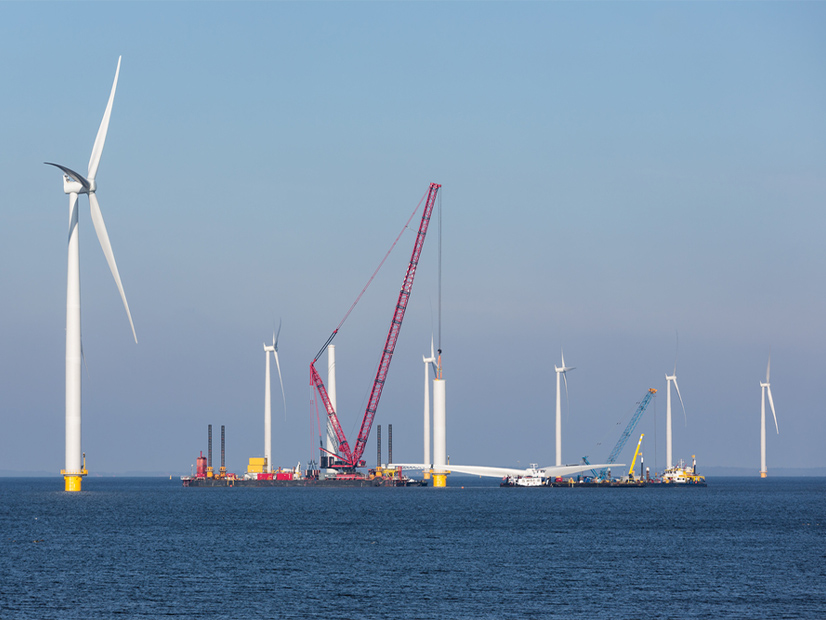
The Massachusetts Senate on Thursday passed a bill 37-3 that would adjust the state’s existing offshore wind procurement price cap if enacted.
As passed, the bill amends Gov. Charlie Baker’s proposal (H.4204) to remove the existing OSW price cap, allowing instead a 10% increase over the winning per-megawatt-hour bid of the state’s previous procurement round. Under the current process, regulators cannot approve a bid that exceeds the winning bid of a previous procurement.
The total bid increase, however, must come from performance-based economic development and employment opportunities that support low- and middle-income populations and diversity, equity and inclusion programs.
Baker’s proposal became part of An Act Driving Climate Policy Forward (S.2819) (Drive Act) through a series of amendments (H.54524) in the House of Representatives that compile a broad set of policies for decarbonizing energy, transportation and buildings. The bill preserves Baker’s proposal to transfer the authority for selecting winning bids from the state’s utilities to the Department of Energy Resources (DOER).
The Drive Act is now before the House for final reconciliation and will go to the governor for his signature.
An amendment to the Drive Act introduced by Sen. Julian Cyr (D) and adopted during Thursday’s session would create a new phase in the state’s 83C OSW procurement process by tacking on 4.4 GW to an existing 5.6 GW procurement authorization.
The new authorization “would have Massachusetts realize one-third of President Biden’s goal to have 30 GW of offshore wind by 2030,” Cyr said on the Senate floor. “It establishes the trajectory for Massachusetts to realize the 15-20 GW of OSW needed under the pathways forecast in the Massachusetts 2050 Decarbonization Roadmap.”
Cyr’s amendment includes protections for coastal and marine environments and wildlife as well as provisions to ensure that federally recognized tribes have a voice in the OSW development process.
Funding
The Drive Act reduces Baker’s proposed $750 million Clean Energy Investment Fund in H.4204 to $100 million. Directives for the center’s funding include clean energy research and workforce and port infrastructure development.
An additional $100 million would be allocated to an Electric Vehicle Adoption Incentive Trust Fund and $50 million to a Charging Infrastructure Deployment Fund. Incentives under the EV fund support passenger car or light-duty truck purchases under $50,000.
A new interagency coordinating council would oversee the infrastructure deployment fund and deliver a report on deployment strategies to the legislature within a year of the bill’s effective date.
Transportation
A plan by the Massachusetts Bay Transportation Authority to electrify its bus fleet by 2040 would become law under the Drive Act, and all the authority’s passenger bus purchases or leases would have to be zero-emission vehicles starting in 2028.
An amendment introduced by Sen. Brendan Creighton (D) and adopted by the Senate would direct MBTA to purchase only electric rail cars by 2031. In addition, the authority would have to develop emission-reduction plans for each of its commuter rail lines.
Senators defeated another amendment that would have required electrification of public fleets, including state fleets and school buses, by 2035.
“Adoption of the provision requiring a phased plan for the electrification of commuter rail that prioritizes environmental justice communities is a welcome decision,” Veena Dharmaraj, director of transportation for Sierra Club Massachusetts, said in a statement.
Sierra Club, she added, is “disappointed” that legislators are reluctant to set fleet electrification targets.
“Communities across the state should not have to wait until 2050 to benefit from pollution-free school buses and municipal and transit fleets,” she said.
Buildings
In keeping with Massachusetts’ efforts to establish a net-zero stretch code that local governments can adopt, the Drive Act would allow a demonstration project for up to 10 municipalities to restrict fossil fuel use in new building construction. DOER would collect data from the project to help assess the effect of fossil-fuel free development on building emissions and costs.
An amendment introduced by Sen. Rebecca Rausch (D) and passed by the senate would direct utilities to provide public annual reports on the amount of natural gas and electricity used in buildings of more than 25,000 square feet.
Environment Massachusetts supported the amendment.
The bill “doesn’t do nearly enough to address the energy we use in our buildings,” Ben Hellerstein, state director for the nonprofit, said in a statement.
Senators defeated a separate amendment that would have established a large buildings energy performance standard like one passed last year for Boston.
The bill also addresses the decision-making process for the Department of Public Utilities’ ongoing investigation (Docket 20-80) into the role of gas distribution companies in reducing greenhouse gas emissions. Regulators would be required to hold an adjudicatory proceeding before approving any state gas utility’s decarbonization plan submitted under the investigation.
Adjudicatory processes would allow constituents to participate as intervenors in hearings and depositions.
Massachusetts’ gas utilities filed proposals with the DPU in March for reducing gas system emissions. Stakeholders have asked the DPU to expand the opportunity for input on the utilities’ proposals in the docket, including provision of technical evidence and cross-examination of utility witnesses.


